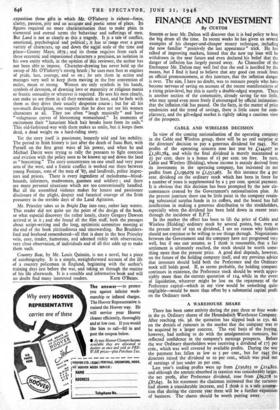FINANCE AND INVESTMENT
,By CUSTOS
SOONER or later Mr. Dalton will discover that it is bad policy to beat the big drum all the time. In recent weeks he has given us several examples of his cheaper-and-cheaper money technique, including the now familiar "positively the last appearance" trick. He has talked of improving markets, hinted that the new tap loan will be withdrawn in the near future and even declared his belief that the danger of inflation has largely passed away. As Chancellor of the Exchequer Mr. Dalton may well feel that the end is justified by the means, but I find it hard to believe that any good can result from an official pronouncement, at this juncture, that the inflation danger is over. The aim, I have no doubt, was to reassure people who have become nervous of saving on account of the recent manifestations of , a rising price-level, but this is surely a double-edged weapon. There is another- section of the community, already saving far too little, . who may spend even more freely if encouraged by official intimations that the inflation risk has passed. On the facts, in the matter of price tendencies and the trend of savings, there is little cause for com- placency, and the gilt-edged market is rightly taking a cautious view of the prospects.
CABLR, AND WIRELESS DECISION In view of the coming nationalisation of the operating company in the Cable and Wireless group, -there will be no real surprise at the directors' decision to pay a generous dividend for 1945. Net profits of the operating concern rose last year by £144,027 to £1,381,784, and- while the final dividend is merely maintained at 21 per cent. there is a bonus of if per cent. tax free. In turn, Cable and Wireless (Holding), whose income is mainly derived from its investment in the operating company, has increased its net profits from £1,199,079 to £1,551,965. In this instance the 4 per cent. dividend on the ordinary stock which has been in force for a number of years is supplemented by a 5 per cent. special payment. It is obvious that this decision has been prompted by the new cir- cumstances created by the Government's nationalisation plan. At the present juncture there can be little point in the company retain- ing substantial surplus funds in its coffers, and the board has full justification in making a generous distribution to the stockholders, especially when the- dividend has been held down in recent years through the incidence of E.P.T.
In the market the effect has been to lift the price of Cable and Wireless (Holding) ordinary stock by several points, bust, even at the present level of 102 ex dividend,,I see no reason why' holders should not continue to be willing to see things through. Negotiations between the Government and the company have not progressed very well, but if one can assume, as I think is reasonable, that a fair settlement is ultimately reached, the stock should be worth some- thing more than the present price. A good deal depends, however, on the future of the holding company itself, and my previous advice that investors should hold both the Preference and the Ordinary stock still holds-good. If, as seems probable, the holding company continues in existence, the Preference stock should, be worth appre- ciably more than the current quotation of 114, while in the event Of liquidation, whatever might be lost on the repayment of the Preference capital—which in my view would be something quite negligible—would be more than offset by a substantial capital profit on the Ordinary stock.
A WAREHOUSE SHARE
There has been some activity during the past three or four weeks in the 5s. Ordinary shares of the Houndsditch Warehouse Company. After reaching 16s. 3d. the quotation has slipped back to ass. 6d. on the denials of rumours in the market that the company was to be ac.quired, by a larger concern. The real basis of the buying, however, had nothing' to do with the amalgamation rumours, but reflected confidence in the company's earnings prospects. Before thg war Ordinary shareholders were receiving a dividend of 171 per cent., which was well covered by available profits. During the war the payment has fallen as low as 5 per cent., but for 1945 the directors raised the dividend to to per cent., which was paid out of earnings of just under 20 per cent.
Last year's trading profits were up from £150,655 to £214,822, and although the amount absorbed in taxation was considerably larger, the net profit, After Preference dividend, rose from £69,278 to £87,645. In his statement the chairman intimated that the turnover had shown a considerable increase, and I think it is a safe assump- tion that during the current year there will be a further expansion of business. The- shares should be worth putting away.


























 Previous page
Previous page